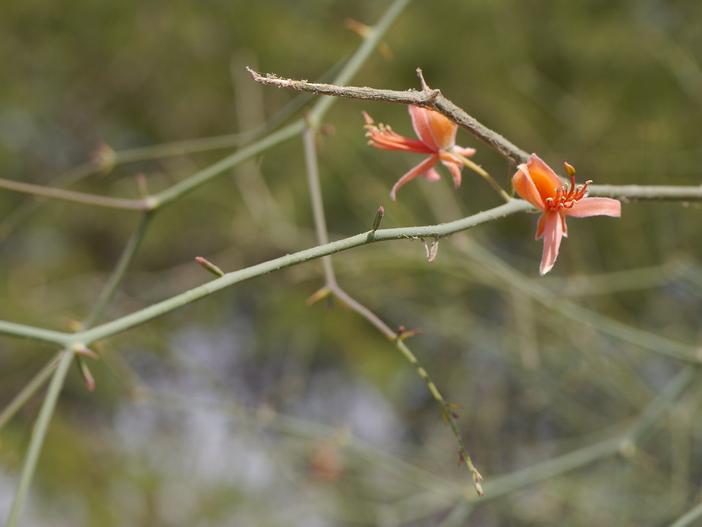Karira
(Capparis decidua)
Karira (Capparis decidua)
/
/

Dinesh Valke
CC BY-SA 2.0
Image By:
Dinesh Valke
Recorded By:
Copyright:
CC BY-SA 2.0
Copyright Notice:
Photo by: Dinesh Valke | License Type: CC BY-SA 2.0 | License URL: https://creativecommons.org/licenses/by-sa/2.0/ | Uploader: Dinesh Valke | Publisher: Flickr


























Estimated Native Range
Summary
Capparis decidua, commonly known as Karira, is a deciduous tree native to arid regions, including grasslands, semi-deserts, and open scrublands, across Africa, the Middle East, and southern Asia. It is well-adapted to hot, dry climates and is often found in areas with calcareous soils. The tree typically grows to a modest height of 5 meters (16.4 feet) and has a spreading habit with a thorny, irregular crown. The bark is smooth and grey, providing a striking contrast to the deep green foliage. Karira produces conspicuous red flowers from March to April and again in August–September, which are followed by pink fleshy berries that ripen by May and October. These berries are a food source for birds and are also consumed by humans.
Karira is highly valued for its extreme drought resistance and some frost tolerance, making it an excellent choice for xeriscaping and ecological restoration projects in arid environments. Its spicy fruits are used in various culinary preparations, such as vegetables, curries, and fine pickles, and the presence of the plant can attract beneficial insectivores. In landscape gardening, it is used for afforestation and reforestation to combat soil erosion. For optimal growth, Karira requires full sun exposure, low to medium water, and well-drained soils. It is recognized as a useful plant in its marginal habitat, contributing to the stability of ecosystems where few other trees can thrive.CC BY-SA 4.0
Karira is highly valued for its extreme drought resistance and some frost tolerance, making it an excellent choice for xeriscaping and ecological restoration projects in arid environments. Its spicy fruits are used in various culinary preparations, such as vegetables, curries, and fine pickles, and the presence of the plant can attract beneficial insectivores. In landscape gardening, it is used for afforestation and reforestation to combat soil erosion. For optimal growth, Karira requires full sun exposure, low to medium water, and well-drained soils. It is recognized as a useful plant in its marginal habitat, contributing to the stability of ecosystems where few other trees can thrive.CC BY-SA 4.0
Plant Description
- Plant Type: Tree
- Height: 12-20 feet
- Width: 8-18 feet
- Growth Rate: Moderate
- Flower Color: Pink, Red
- Flowering Season: Spring, Summer, Fall
- Leaf Retention: Deciduous
Growth Requirements
- Sun: Full Sun
- Water: Low, Medium
- Drainage: Fast
Common Uses
Drought Tolerant, Low Maintenance, Showy Flowers
Natural Habitat
Arid regions, including grasslands, semi-deserts, and open scrublands
Other Names
Common Names:
Scientific Names: , Capparis decidua, Capparis aphylla, Capparis sodada, Sodada decidua, Lindackera capparoidea,
GBIF Accepted Name: Capparis decidua (Forssk.) Edgew.